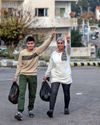
THE LAST TIME DIANE FOLEY SPOKE to her son James was in November 2012, when he called her at work in New Hampshire. Foley, a nurse practitioner at the clinic where her husband, John, was a doctor, was relieved to hear her son's voice. A few months earlier, Jim, as he was known, had left the US for Syria to work as a freelance videographer. That decision, coming less than a year after he had been kidnapped and detained for six weeks while reporting in Libya, horrified his family. Now, the 39-year-old was in an even more dangerous war zone. Foley couldn't really talk, she told her son; the clinic was busy. "That's OK, Mom," said Jim, cheerfully, and promised to call her at Thanksgiving. A few weeks later, he was kidnapped by Islamic State (IS). Eighteen months after that, he was beheaded by a masked. terrorist, the video uploaded to social media and viewed with horror all around the world. As Diane Foley says of the brief exchange she had that day with her gentle, goofy, eldest son: "I never heard his voice again."
It is almost 10 years since the death of James Foley and, at 75, his mother isn't remotely done talking about it. We are in New York, at a restaurant downtown, where Diane Foley presents as a slight and glamorous figure, dark-haired and all in black but for a silver cross around her neck. She has written a book with the novelist Colum McCann, called American Mother, in which she recounts the story of her son's kidnapping and murder, and her relentless campaign, in its wake, to improve the chances of Americans wrongfully detained abroad - including, as we speak, American dual nationals being held in Gaza by Hamas.
この記事は The Guardian Weekly の February 16, 2024 版に掲載されています。
7 日間の Magzter GOLD 無料トライアルを開始して、何千もの厳選されたプレミアム ストーリー、9,000 以上の雑誌や新聞にアクセスしてください。
すでに購読者です ? サインイン
この記事は The Guardian Weekly の February 16, 2024 版に掲載されています。
7 日間の Magzter GOLD 無料トライアルを開始して、何千もの厳選されたプレミアム ストーリー、9,000 以上の雑誌や新聞にアクセスしてください。
すでに購読者です? サインイン

'It's really a disaster' The fight to save lives as gang war consumes capital
Dr James Gana stepped out on to the balcony of his hospital overlooking a city under siege. \"There's a sensation of 'What's next?'. Desperation is definitely present,\" the Médecins Sans Frontières (MSF) medic said, as he stared down at one of scores of camps for displaced Haitians in their country's violence-plagued capital.

Trailblazers The inspiring people we met around the world this year
From an exuberant mountaineer to a woman defiantly facing the guns of war, here are some of the brave individuals who gave us hope in a tumultuous 2024

Votes of confidence
From India to Venezuela and Senegal to the US, more people voted this year than ever before, with over 80 elections across the world. With rising authoritarianism and citizen-led resistance revealing its vulnerabilities and resilience in the face of unprecedented challenges, has democracy reached its breaking or turning point?

Out of touch How president sealed his own fate in martial law gambit
For Yoon Suk Yeol, this month's short-lived martial law declaration wasn't just a catastrophic miscalculation - it was the culmination of a presidency that had been troubled from the start.

Son of the soil Who is François Bayrou, the farmer turned prime minister?
François Bayrou, the new French prime minister, calls himself a country man. A tractor-driving \"son of the soil\" and breeder of thoroughbreds, he has run for president three times, saying his rural roots and centrist politics led him to try to find common ground between left and right.

Power plant workers keeping the lights on
The Guardian Weekly visits a Soviet-era coal-fired thermal installation to learn how it has held up to Russian attacks

Prince charmed Alleged spy scandal may have exposed China threat
Prince Andrew should be commended for doing Britain a great service, according to longstanding China watcher Charles Parton. The now marginalised royal has, the analyst observed, \"almost single handedly\" succeeded \"in highlighting the threat to free and open countries\" posed by the contemporary Chinese state.

In Moscow, a new life of secluded irrelevance awaits Assad
He was whisked away without a last message to his people, the aircraft's transponder deliberately switched off to avoid detection as it departed from an airbase in Syria.

'We fear new oppression' Alawites worry over rebel rule
To prepare khubeiza, the leaves of the kale-like plant must be roughly chopped and sauteed with onions, garlic and a dash of salt. According to folklore, the recipe originated among the Alawite communities who lived in Syria's mountainous coastline where the fibrous, wild-growing plant can be found in abundance. So poor were the Alawites in Ottoman times, the story goes, that the only food they could find to eat was khubeiza, which sprouts like a stubborn weed every spring.

'Gisèle is waiting for explanations'
The Pelicot rape trial has horrified the world. But as it comes to an end, the questions it has raised about French society and rape culture have still not been answered.